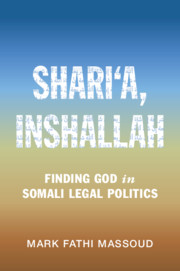The latest book from Politics and Legal Studies Professor Mark Fathi Massoud, Shari‘a, Inshallah: Finding God in Somali Legal Politics, challenges Western notions of Islam and secular law-making by revealing the many ways in which Somali Muslims have embraced Sharia, a system of Islamic religious rules.
Western democracies tend to carefully guard separation of church and state, but in many predominantly Muslim countries, a majority of Muslims say they want to be governed by Sharia. Massoud, a human rights lawyer, sought to understand why. So he took a closer look at Somalia, a country where 99 percent of the population are Sunni Muslims.
Somalia is perhaps best known for its struggles with piracy, terrorism, famine, and civil war, but the region—which includes the self-declared independent state of Somaliland—also provides an example of the diversity of ways in which Sharia has been interpreted and applied throughout history. Dictators and European colonial administrators used Sharia to justify their power, but Somalis have also invoked the Quran, Islam’s holy book and a primary source of Sharia, to resist oppressors, expel warlords, fight for gender equality, and build a path to the rule of law.
“People are reinterpreting, reasserting, and reclaiming the sources of Sharia—whether they want to oppress, or whether they want to progress,” Massoud said. “My book is an antidote to those who see religion as an obstacle to peace.”
Shari‘a, Inshallah documents these findings through Massoud’s historical research and extensive field work in East Africa. He also studied theology for a year in order to better understand the underpinnings of Islamic, Christian, and Jewish faiths. Massoud was raised Catholic in California after his family fled a dictatorship in Sudan.
Internationally, Sharia is often portrayed as a tool of oppression or violent extremism, but Massoud’s book includes many examples of Sharia as a force for liberation. Perhaps the most striking is the work of modern Somali women’s rights activists.
Massoud spoke with many women who said that organizations like the United Nations communicate about women’s rights in ways that do not resonate with Somalis. Activists within the country have found that one of the most effective ways to create meaningful change is through the lens of Sharia. Rather than emphasizing legal rights under international law, Somali activists focus on teaching how equality for women is compatible with the principles of Islam. Massoud says this is an important lesson for the international community.
“There’s a disconnect between how international lawyers are thinking about human rights and how the people for whom human rights matter most are thinking about it,” Massoud explained. “It’s not just about what the law says. It’s about how God’s will requires political leaders to protect the rights of women, minorities, and refugees. For some people, God means much more than a constitution.”
Shari‘a, Inshallah also demonstrates the importance of religious moral authority by recounting how ocean robberies declined when religious leaders spoke out against piracy. Activists have also used Islam to bring about environmental protections. Massoud said these and many other examples from the book demonstrate how, in Somalia and Somaliland, “the rule of law and the rule of God are not on a collision course; they could actually be swinging in the same direction.” And this relationship between law and religion has many parallels in American history.
“During so much of the state-building process in the United States, judges saw Christianity as part of the common law, which gave the legal system legitimacy,” Massoud said. “Religion is the unseen foundation of the law, and religious systems can be interpreted in a variety of ways, just like legal systems.”
Ultimately Shari‘a, Inshallah’s insights demonstrate how Sharia, like any form of religion or law, can be used to either uphold or struggle against systems of oppression. And international law experts will need to understand and acknowledge the role of Islam in order to support human rights efforts in Somalia and other Muslim-majority nations.
“As international lawyers and activists, we can promote the power of human rights not just by writing new laws but also by understanding how people submit to the will of God,” Massoud said. “If we want to build peace, we have to appreciate God—whether or not we believe.”




